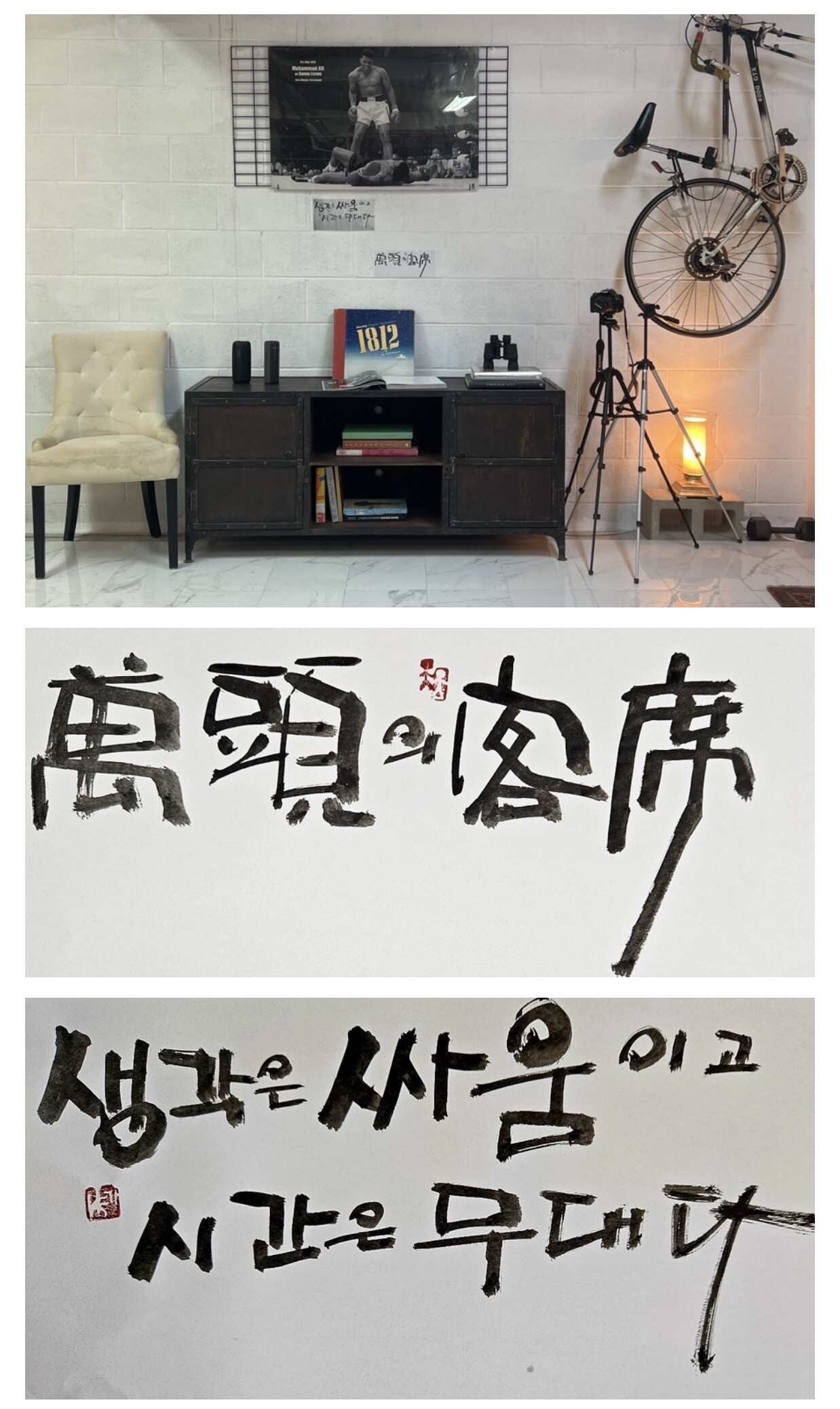
(Thought is a Battle, and Time is a Stage)
1. 서론-한 문장에 담긴 인간학적 질문
(Introduction – A Humanistic Question in One Sentence)
“생각은 싸움이고, 시간은 무대다.” 이 문장은 인간 존재의 본질을 간결하게 포착한다.
생각은 내면의 전투이며, 시간은 그 전투가 드러나는 무대이다. 이 문장은 철학적 사유와
실존적 행위를 동시에 함축하고 있다.
“Thought is a battle, and time is a stage.” This sentence captures the essence of human
existence concisely. Thought is an inner struggle, and time is the stage where that struggle is
revealed. It embodies both philosophical reflection and existential action.
2. 생각은 싸움이다 – 인식의 투쟁
(Thought is a Battle – The Struggle of Consciousness)
플라톤에게 사유는 ‘이데아’를 향한 영혼의 상승이었고, 니체에게는 ‘권력의지’와의
싸움이었다. 인간의 생각 속에는 언제나 두 개의 힘이 공존한다 — 익숙함에 머무르려는
힘과 새로운 의미를 창조하려는 힘이다. 이 두 힘의 충돌 속에서 사유는 생겨난다.
하이데거는 이를 ‘존재를 향한 항해’라 불렀다.
For Plato, thought was the soul’s ascent toward the realm of Ideas; for Nietzsche, it was a
struggle with the will to power. Within every human thought dwell two opposing forces —
the desire to remain within the familiar and the drive to create new meaning. From their
collision, genuine thought arises. Heidegger called this ‘a voyage toward Being’.
3. 시간은 무대다 – 존재의 드라마
(Time is a Stage – The Drama of Existence)
시간은 단순한 흐름이 아니라 존재가 자신을 드러내는 무대다. 헤겔은 역사를 ‘정신의
연극’이라 불렀고, 키르케고르는 인간을 ‘시간 속에서 실존하는 배우’라 했다. 우리는 그
무대 위에서 각자의 역할을 수행하지만, 대본은 미리 주어지지 않는다. 따라서 삶은
즉흥적이지만 책임 있는 연극이다.
Time is not a mere flow but the stage upon which existence reveals itself. Hegel called
history ‘the drama of Spirit,’ and Kierkegaard saw man as ‘an actor existing within time.’ We
perform our roles upon that stage, yet no script is pre-written. Thus, life becomes an
improvisational yet responsible play.
4. 결합의 철학 – 사유와 시간의 공명
(The Philosophy of Convergence – Resonance Between Thought and Time)
사유는 내면의 싸움으로 시작되지만, 그 싸움의 결과는 시간이라는 무대 위에서
드러난다. 칸트는 “시간은 모든 현상의 형식”이라 했고, 니체는 “생각은 몸으로 말하는 또
하나의 춤”이라 했다. 우리가 싸우는 이유는 생각하기 위해서가 아니라, 그 생각을
살아내기 위해서다. 시간은 그 싸움의 흔적을 담는 무대다.
Thought begins as an internal battle, but its outcome is revealed on the stage of time. Kant
said, ‘Time is the form of all appearances,’ and Nietzsche declared, ‘Thought is another
dance spoken through the body.’ We fight not merely to think, but to live out that thought.
Time bears the traces of that struggle.
5. 결론 – 존재의 연극
(Conclusion – The Theatre of Existence)
결국 인간은 사유의 전사이자 시간의 배우다. 생각은 진리와 자신을 향한 싸움이며,
시간은 그 싸움이 드러나는 무대다. 그 무대 위에서 우리는 사유를 연기하며 존재를
증명한다. 철학은 그 연극을 자각하는 순간 시작된다.
Ultimately, man is both a warrior of thought and an actor of time. Thought is a battle toward
truth and self, and time is the stage where that battle is enacted. Upon that stage, we
perform our thoughts and affirm our being. Philosophy begins the moment we become
aware of that play.
DISCLAIMERS: 이 글은 개인회원이 직접 작성한 글로 내용에 대한 모든 책임은 작성자에게 있으며, 이 내용을 본 후 결정한 판단에 대한 책임은 게시물을 본 이용자 본인에게 있습니다.
라디오코리아는 이 글에 대한 내용을 보증하지 않으며, 이 정보를 사용하여 발생하는 결과에 대하여 어떠한 책임도 지지 않습니다.
라디오코리아의 모든 게시물에 대해 게시자 동의없이 게시물의 전부 또는 일부를 수정 · 복제 · 배포 · 전송 등의 행위는 게시자의 권리를 침해하는 것으로 원칙적으로 금합니다.
이를 무시하고 무단으로 수정 · 복제 · 배포 · 전송하는 경우 저작재산권 침해의 이유로 법적조치를 통해 민, 형사상의 책임을 물을 수 있습니다.
This article is written by an individual, and the author is full responsible for its content. The viewer / reader is responsible for the judgments made after viewing the contents. Radio Korea does not endorse the contents of the articles and assumes no responsibility for the consequences of using the information.
In principle, all posts in Radio Korea are prohibited from modifying, copying, distributing, and transmitting all or part of the posts without the consent of the publisher. Any modification, duplication, distribution, or transmission without prior permission can subject you to civil and criminal liability.